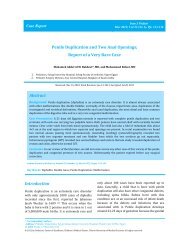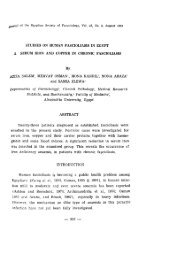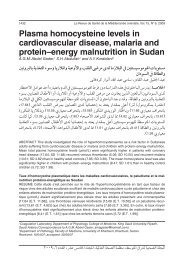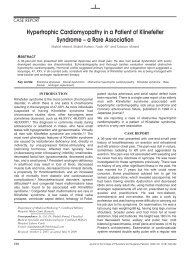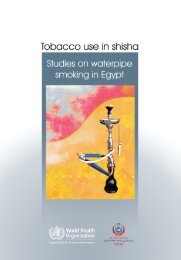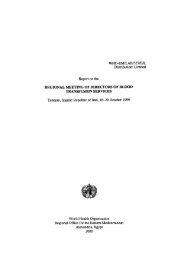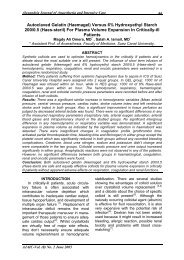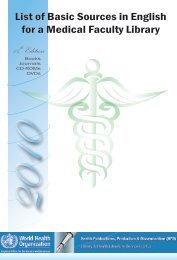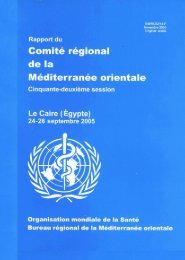voices of the unheard [pdf 19.48Mb - WHO Eastern Mediterranean ...
voices of the unheard [pdf 19.48Mb - WHO Eastern Mediterranean ...
voices of the unheard [pdf 19.48Mb - WHO Eastern Mediterranean ...
You also want an ePaper? Increase the reach of your titles
YUMPU automatically turns print PDFs into web optimized ePapers that Google loves.
<strong>WHO</strong> Library Cataloguing in Publication Data<br />
World Health Organization. Regional Office for <strong>the</strong> <strong>Eastern</strong> <strong>Mediterranean</strong><br />
Tuberculosis: <strong>voices</strong> <strong>of</strong> <strong>the</strong> <strong>unheard</strong> / World Health Organization.<br />
Regional Office for <strong>the</strong> <strong>Eastern</strong> <strong>Mediterranean</strong><br />
p.<br />
ISBN 978-92-9021-636-0<br />
1. Tuberculosis, Pulmonary – Afghanistan 2. Pictorial Works I. Title<br />
II. Regional Office for <strong>the</strong> <strong>Eastern</strong> <strong>Mediterranean</strong><br />
(NLM Classification: WF 300)<br />
Photographic acknowledgement: All <strong>the</strong> photographs were taken by Ricardo Venturi.<br />
Tuberculosis: <strong>voices</strong> <strong>of</strong> <strong>the</strong> <strong>unheard</strong><br />
© World Health Organization 2008<br />
All rights reserved.<br />
The designations employed and <strong>the</strong> presentation <strong>of</strong> <strong>the</strong> material in this<br />
publication do not imply <strong>the</strong> expression <strong>of</strong> any opinion whatsoever on<br />
<strong>the</strong> part <strong>of</strong> <strong>the</strong> World Health Organization concerning <strong>the</strong> legal status<br />
<strong>of</strong> any country, territory, city or area or <strong>of</strong> its authorities, or concerning<br />
<strong>the</strong> delimitation <strong>of</strong> its frontiers or boundaries. Dotted lines on maps<br />
represent approximate border lines for which <strong>the</strong>re may not yet be full<br />
agreement.<br />
The mention <strong>of</strong> specific companies or <strong>of</strong> certain manufacturers’ products<br />
does not imply that <strong>the</strong>y are endorsed or recommended by <strong>the</strong> World<br />
Health Organization in preference to o<strong>the</strong>rs <strong>of</strong> a similar nature that are<br />
not mentioned. Errors and omissions excepted, <strong>the</strong> names <strong>of</strong> proprietary<br />
products are distinguished by initial capital letters.<br />
Concept and Design: Design Frame Egypt www.designframe.net<br />
The World Health Organization does not warrant that <strong>the</strong> information<br />
contained in this publication is complete and correct and shall not be<br />
liable for any damages incurred as a result <strong>of</strong> its use.<br />
Publications <strong>of</strong> <strong>the</strong> World Health Organization can be obtained from<br />
Distribution and Sales, World Health Organization, Regional Office<br />
for <strong>the</strong> <strong>Eastern</strong> <strong>Mediterranean</strong>, PO Box 7608, Nasr City, Cairo 11371,<br />
Egypt (tel: +202 2670 2535, fax: +202 2670 2492; email: DSA@emro.<br />
who.int). Requests for permission to reproduce <strong>WHO</strong> EMRO publications,<br />
in part or in whole, or to translate <strong>the</strong>m – whe<strong>the</strong>r for sale or for<br />
noncommercial distribution – should be addressed to <strong>the</strong> Coordinator,<br />
Knowledge and Management and Sharing, at <strong>the</strong> above address; email<br />
HIT@emro.who.int .
Tuberculosis<br />
<strong>voices</strong> <strong>of</strong> <strong>the</strong> <strong>unheard</strong>
As public health experts, we use numbers to present <strong>the</strong><br />
tremendous size <strong>of</strong> <strong>the</strong> tuberculosis dilemma: 2 million deaths in<br />
<strong>the</strong> world every year and 120 000 deaths in <strong>the</strong> <strong>WHO</strong> <strong>Eastern</strong><br />
<strong>Mediterranean</strong> Region alone. These are, without doubt, extremely<br />
important and disturbing statistics that describe <strong>the</strong> enormity<br />
<strong>of</strong> <strong>the</strong> challenge we confront. However, away from numerical<br />
depiction <strong>of</strong> <strong>the</strong> problem, its human face needs to be recognized<br />
and emphasized. The suffering caused by tuberculosis has many<br />
aspects, social and economic. It is imperative that we understand<br />
<strong>the</strong> suffering and hardship tuberculosis imposes on <strong>the</strong> people<br />
who have <strong>the</strong> disease and on <strong>the</strong>ir families, and <strong>the</strong> struggle each<br />
faces to cope with <strong>the</strong> arduous changes in <strong>the</strong>ir lives as a result.<br />
This pictorial book, Tuberculosis: <strong>voices</strong> <strong>of</strong> <strong>the</strong> <strong>unheard</strong> presents<br />
that human face <strong>of</strong> tuberculosis. Indeed, each face clearly<br />
communicates <strong>the</strong> measure <strong>of</strong> suffering in each person living with<br />
tuberculosis. They are from Afghanistan; women and men, young<br />
and old––each is a victim <strong>of</strong> tuberculosis, a disease we have<br />
known for centuries and a disease that is completely preventable<br />
and curable. Some <strong>of</strong> <strong>the</strong>se people, unfortunately, are among <strong>the</strong><br />
many dying every day around <strong>the</strong> world. The Government <strong>of</strong><br />
Afghanistan and <strong>the</strong> World Health Organization are responding to<br />
this challenge, supported by international tuberculosis advocates<br />
like Anna Cataldi, Ambassador <strong>of</strong> <strong>the</strong> Stop TB Partnership and a<br />
former United Nations Messenger <strong>of</strong> Peace and Ricardo Venturi,<br />
a renowned photographer. They visited Afghanistan in June<br />
In <strong>the</strong> Name <strong>of</strong> God, <strong>the</strong> Compassionate, <strong>the</strong> Merciful<br />
Foreword<br />
2007 not just to bring <strong>the</strong>se images <strong>of</strong> <strong>the</strong> misery wrought by a<br />
preventable disease but to give a voice to those who cannot make<br />
<strong>the</strong>mselves heard.<br />
Women are at <strong>the</strong> centre <strong>of</strong> this agony. In Afghanistan, 70% <strong>of</strong><br />
tuberculosis patients are female. They are mo<strong>the</strong>rs, daughters,<br />
wives and children. Their pain deepens when <strong>the</strong>ir fa<strong>the</strong>rs,<br />
husbands and siblings suffer from <strong>the</strong> same affliction. Ricardo<br />
Venturi’s photographs not only detail <strong>the</strong> life <strong>of</strong> ordinary Afghan<br />
women affected by tuberculosis but also portray <strong>the</strong> vulnerability<br />
and neglect haunting <strong>the</strong>ir lives. The photographs, at <strong>the</strong> same<br />
time, take <strong>the</strong> viewer on a journey <strong>of</strong> discovery <strong>of</strong> <strong>the</strong> meaning <strong>of</strong><br />
suffering in conflict-ravaged countries, so expressively described<br />
by Anna Cataldi in her powerful story, in <strong>the</strong> opening pages.<br />
Each face among <strong>the</strong> photographs vividly asks us to think <strong>of</strong> what<br />
can be done to alleviate <strong>the</strong> pain. Tuberculosis is indeed totally<br />
preventable and curable, and thus <strong>the</strong>se faces should be wearing<br />
smiles and radiating life. In fact, <strong>the</strong>se photographs compel us to<br />
consider that this is <strong>the</strong> time to act, to stop <strong>the</strong> loss and contribute<br />
towards halting tuberculosis. I hope you too can hear <strong>the</strong> <strong>unheard</strong><br />
<strong>voices</strong> in <strong>the</strong> photographs and will respond to <strong>the</strong>ir call.<br />
Hussein A. Gezairy MD FRCS<br />
Regional Director for <strong>the</strong> <strong>Eastern</strong> <strong>Mediterranean</strong>
hospital number: 33062
Fazilla arrived at <strong>the</strong> hospital on May 19, 2007<br />
After two years <strong>of</strong> false opinions, she was finally<br />
diagnosed with tubercular spondylitis
She is not <strong>the</strong> only one...<br />
Every year tuberculosis kills 15,000 people in<br />
Afghanistan alone, nearly 13,000 are women<br />
who endure <strong>the</strong> worst living conditions
Every patient under DOTS has a treatment card to ensure <strong>the</strong>y receive <strong>the</strong>ir treatment on time
Families in despair<br />
Sakia, who has been receiving TB treatment for a month, lives in a one room house with<br />
her grandfa<strong>the</strong>r, who is blind, and seven o<strong>the</strong>rs; her mo<strong>the</strong>r died <strong>of</strong> TB 10 years ago
Dealing with loss<br />
Sakia and her youngest child in front <strong>of</strong> her home
Torn apart<br />
Naro<strong>of</strong>a, who comes from <strong>the</strong> north <strong>of</strong> Afghanistan, is 22 years old and came to Kabul<br />
alone for treatment; she is living in <strong>the</strong> TB hostel with no family to support her
Till <strong>the</strong> end...
...or a new beginning...<br />
Omar has spinal TB and is paralysed but doctors are hopeful<br />
he will recover 70% <strong>of</strong> his mobility with rehabilitation<br />
if we act now
Until now <strong>the</strong> people <strong>of</strong> Afghanistan<br />
have been underserved,<br />
underfed and overlooked<br />
It’s time...
[Stop]
Tuberculosis in Afghanistan<br />
by Anna Cataldi<br />
Stop TB Ambassador and former UN Messenger <strong>of</strong> Peace<br />
They come in <strong>the</strong>ir hundreds every morning (except Friday, which is <strong>the</strong><br />
Holy day in Afghanistan), arriving in dribs and drabs to wait patiently<br />
for <strong>the</strong> Ali Abad orthopedic clinic, run by <strong>the</strong> International Red Cross in<br />
Kabul, to open. All suffering from some severe physical handicap, <strong>the</strong>y are<br />
prepared to submit to any treatment that might restore <strong>the</strong> mobility <strong>the</strong>y<br />
need to lead a more normal life. Injuries sustained in war, loss <strong>of</strong> limbs to<br />
landmines, accidents at work, <strong>the</strong> consequences <strong>of</strong> polio, scoliosis, arthritis,<br />
paralysis or simple malnutrition – <strong>the</strong>se are <strong>the</strong> everyday problems in a<br />
country such as Afghanistan.
June 2007, Kabul, capital <strong>of</strong> Afghanistan where people are dying from a totally<br />
preventable and curable disease, tuberculosis (TB), better known to Afghanis as sil
Fazilla, a girl <strong>of</strong> 14, arrived on 19th May 2007. Her hospital<br />
number would be 33062. Her fa<strong>the</strong>r, a tall, silent man, carried her<br />
in, cradling her gently in his arms. Her mo<strong>the</strong>r followed, shielding<br />
<strong>the</strong> wasted, pain-racked body <strong>of</strong> her child from accidental knocks.<br />
The pain came from sores caused by months spent practically<br />
immobile in bed, when every movement increased <strong>the</strong> suffering<br />
that was her only companion during <strong>the</strong> interminable hours, by<br />
day and night. No school, no sky, no sun, no clouds, nothing but <strong>the</strong><br />
walls <strong>of</strong> <strong>the</strong> humble home in Yaka Tut, one <strong>of</strong> <strong>the</strong> poorest districts<br />
in Kabul. Until <strong>the</strong> age <strong>of</strong> ten, Fazilla had been a perfectly normal<br />
little girl, lively, active, a happy member <strong>of</strong> <strong>the</strong> numerous family<br />
comprising parents, grandparents, five bro<strong>the</strong>rs and a sister.<br />
Then she began to complain <strong>of</strong> pain in her legs. Slowly, <strong>the</strong><br />
pain, now excruciating, began creeping up to her back. Walking<br />
became more difficult every day. They took her to see <strong>the</strong> doctor.<br />
He diagnosed rheumatoid arthritis. This was in 2004. Despite <strong>the</strong><br />
prescribed drugs, <strong>the</strong> painkillers and anti-inflammatories, <strong>the</strong><br />
pain continued to intensify. Different prescriptions, more tests.<br />
X-rays revealed a serious scoliosis <strong>of</strong> <strong>the</strong> spine. In 2005, a team<br />
<strong>of</strong> foreign doctors, specialist pediatricians, carried out numerous<br />
tests at <strong>the</strong> Indira Gandhi hospital. They suspected a tumour, but<br />
this turned out not to be <strong>the</strong> case. Fazilla was sent home. She was<br />
now completely unable to walk. Her spine was so deformed that she<br />
was bent almost double. Even sitting was impossible.<br />
In <strong>the</strong> summer <strong>of</strong> 2006 <strong>the</strong> condition was finally diagnosed:<br />
a very rare, insidious form <strong>of</strong> tuberculosis affecting <strong>the</strong> bones.<br />
Known to science as tubercular spondylitis, or Pott’s Disease, it is<br />
notoriously difficult to diagnose.<br />
It was at this point that she was put on <strong>the</strong> standard treatment<br />
already in use for a decade against all forms <strong>of</strong> TB. It consists <strong>of</strong> a<br />
cocktail <strong>of</strong> antibiotics effective against Mycobacterium tuberculosis,<br />
<strong>the</strong> micro-organism which was slowly sapping <strong>the</strong> child’s life. The<br />
full course lasts for eight months, during which time <strong>the</strong> tablets<br />
have to be taken regularly every day, with no disruptions and<br />
extreme punctuality. Strict adherence to <strong>the</strong> prescribed schedule<br />
is <strong>the</strong> most important factor governing <strong>the</strong> efficacy <strong>of</strong> <strong>the</strong> cure.<br />
In view <strong>of</strong> this, <strong>the</strong> World Health Organization (<strong>WHO</strong>) set up<br />
<strong>the</strong> Directly Observed Treatment Short-course (DOTS), providing<br />
for <strong>the</strong> strict monitoring <strong>of</strong> <strong>the</strong> <strong>the</strong>rapy for optimum <strong>the</strong>rapeutic<br />
benefit. Applied since 1995 to more than 26 million people in 187<br />
different countries, DOTS has been responsible for <strong>the</strong> complete<br />
cure <strong>of</strong> <strong>the</strong> illness in 84% <strong>of</strong> cases. The total cost for 8 – 9 months<br />
<strong>of</strong> treatment? Twenty US dollars, less than 18 euros!!<br />
When <strong>the</strong> course had been completed, Fazilla was tested again<br />
for TB. The result this time was negative. There was not a single<br />
trace <strong>of</strong> <strong>the</strong> dreaded Mycobacterium tuberculosis in her body.<br />
Sadly, in spite <strong>of</strong> <strong>the</strong> cure <strong>the</strong>re is no happy ending to report,<br />
because Fazilla’s bones have been irreversibly damaged, especially<br />
during <strong>the</strong> very vulnerable growth stage <strong>of</strong> adolescence. The TB<br />
has been defeated, <strong>the</strong> degenerative process arrested, but <strong>the</strong><br />
consequences remain. And <strong>the</strong> damage left behind in <strong>the</strong> wake<br />
<strong>of</strong> this unequal battle is devastating. Her spine, which will never<br />
be straight again, causes muscles to contract throughout <strong>the</strong><br />
pa<strong>the</strong>tically wasted body scarred as a result <strong>of</strong> <strong>the</strong> long time spent<br />
in bed.<br />
At <strong>the</strong> Red Cross clinic <strong>the</strong>y will do <strong>the</strong>ir best to help her, alleviating<br />
<strong>the</strong> pain with medicines and providing some rehabilitation <strong>the</strong>rapy.<br />
Supported in a cradle <strong>of</strong> foam rubber cushions, Fazilla is very<br />
gently turned almost every hour. Little by little <strong>the</strong> lesions will<br />
heal. Fed on a very high-calorie diet – five meals a day – she will<br />
eventually regain that modicum <strong>of</strong> energy necessary for attempting<br />
<strong>the</strong> first gentle physio<strong>the</strong>rapy exercises. Perhaps, if things go well,<br />
she will be able to sit with <strong>the</strong> help <strong>of</strong> a brace and walk a few steps<br />
supported by a Zimmer frame. But <strong>the</strong> future for this girl with her<br />
sensitive face and dark, deep-set eyes bright with intelligence is<br />
already marked out. No man, in a country as poor as Afghanistan,<br />
would dream <strong>of</strong> marrying a woman this badly handicapped who<br />
could be <strong>of</strong> no help in <strong>the</strong> home.<br />
A smile lights up Fazilla’s face when <strong>the</strong>y talk to her about<br />
resuming her studies. As a bedridden invalid, she lost three years<br />
<strong>of</strong> schooling. She dreams about learning English. Here at <strong>the</strong><br />
centre <strong>the</strong>re are teachers ready to help her, but at home, how can<br />
she possibly attend school? Sad enough already, Fazilla’s case is<br />
even sadder when one considers that had her TB been diagnosed<br />
from <strong>the</strong> start she could have been completely cured in a matter<br />
<strong>of</strong> months with very little expense and no need for hospitalization.<br />
The fact is that it is now possible not only to control TB but to cure<br />
it. Unlike AIDS, for example, which can be controlled by <strong>the</strong> new<br />
drugs but never cured.<br />
As old as <strong>the</strong> history <strong>of</strong> man himself (<strong>the</strong> genome <strong>of</strong> TB has<br />
been found in Egyptian mummies) but easily recognizable despite<br />
its various names and <strong>the</strong> diverse cultures in which appeared<br />
throughout <strong>the</strong> centuries TB was an almost inevitable sentence<br />
<strong>of</strong> death for whoever contracted <strong>the</strong> disease. Then one day in<br />
March 1882 an obscure German doctor’s report that in <strong>the</strong> course<br />
<strong>of</strong> his experiments he had succeeded in discovering <strong>the</strong> hi<strong>the</strong>rto
unknown cause <strong>of</strong> <strong>the</strong> disease, immediately revolutionized <strong>the</strong><br />
history <strong>of</strong> TB.<br />
By producing pro<strong>of</strong> that <strong>the</strong> cause <strong>of</strong> Tuberculosis was a specific<br />
microscopic bacillus (Mycobacterium tuberculosis) this doctor,<br />
Robert Koch, made diagnosis possible and laid <strong>the</strong> foundations <strong>of</strong><br />
a <strong>the</strong>rapeutic approach that only a few decades later would enable<br />
<strong>the</strong> medical pr<strong>of</strong>ession to treat a disease against which mankind<br />
had been powerless for thousands <strong>of</strong> years.<br />
In spite <strong>of</strong> this, nearly two million people still die from TB<br />
every year. The figure quoted by <strong>the</strong> <strong>WHO</strong> is one million eight<br />
hundred thousand or five thousand a day. Imagine reading in<br />
<strong>the</strong> paper day after day that 15 planes each carrying 300 people<br />
had crashed with no survivors. More devastating than malaria,<br />
which affects only countries plagued by mosquitoes, TB – spread<br />
not through direct contact but by airborne droplets – can infect<br />
anyone anywhere.<br />
Data provided by <strong>the</strong> <strong>WHO</strong> also show that two billion people<br />
– one third <strong>of</strong> <strong>the</strong> world’s population – have been infected by <strong>the</strong><br />
TB bacillus. Not all <strong>of</strong> <strong>the</strong>m become ill, however. In nine cases out<br />
<strong>of</strong> ten <strong>the</strong> bacillus remains latent and causes no problems. But<br />
in <strong>the</strong> case <strong>of</strong> a weakened immune system – <strong>the</strong> populations <strong>of</strong><br />
Third-World countries are <strong>the</strong> most vulnerable because TB, AIDS<br />
and poverty go hand in hand – <strong>the</strong>n <strong>the</strong> bacillus becomes active,<br />
attacks <strong>the</strong> host body and causes <strong>the</strong> disease. The most common<br />
form is TB <strong>of</strong> <strong>the</strong> lungs, or pulmonary TB. In Afghanistan <strong>the</strong>y<br />
call it «sill». The immediately recognizable symptoms are a cough<br />
accompanied by <strong>the</strong> spitting <strong>of</strong> blood.<br />
Ten years ago Zakayeva, a Hazara woman <strong>of</strong> 25 pregnant with<br />
her fifth child while still breast-feeding <strong>the</strong> fourth, watched her<br />
mo<strong>the</strong>r die <strong>of</strong> TB. Even before <strong>the</strong> cough started to rack her own<br />
chest she was in no doubt whatsoever about <strong>the</strong> disease that was<br />
making her feel so tired she could not stand, that was drenching<br />
her body with sweat and inducing icy shivers.<br />
Zakayeva’s family lives in extreme poverty even by <strong>the</strong> standards<br />
<strong>of</strong> Afghanistan, a country that is one <strong>of</strong> <strong>the</strong> poorest <strong>of</strong> <strong>the</strong> poor.<br />
The irregular earnings <strong>of</strong> her husband, a builder dependent on<br />
piece-work, are frequently insufficient to feed <strong>the</strong> four children,<br />
his wife and himself and an old, sick grandfa<strong>the</strong>r who all live<br />
crowded into a single room almost always in deep darkness. Even<br />
on sunny days no light manages to penetrate <strong>the</strong> gloom from <strong>the</strong><br />
single north-facing window. In spite <strong>of</strong> all this, Zakayeva’s smile<br />
was sweetness itself as, cradling her latest-born in her arms,<br />
she said that from <strong>the</strong> day she began her TB treatment things<br />
had – thanks be to God – improved, she no longer suffered from<br />
headaches and felt less tired. She receives her tablets free from<br />
<strong>the</strong> <strong>WHO</strong> and her treatment card entitles her to receive a sack <strong>of</strong><br />
rice and a can <strong>of</strong> oil every month. These supplementary rations are<br />
provided by <strong>the</strong> World Food Programme (WFP) which, because<br />
malnutrition is so <strong>of</strong>ten <strong>the</strong> root cause <strong>of</strong> <strong>the</strong> disease, collaborates<br />
with <strong>the</strong> <strong>WHO</strong> in <strong>the</strong> fight against TB.<br />
One has to wonder how much <strong>of</strong> this food will benefit Zakayeva<br />
herself. Afghan women, like those in o<strong>the</strong>r Asian countries, having<br />
cooked <strong>the</strong> food will eat only <strong>the</strong> remains <strong>of</strong> <strong>the</strong> meal when all <strong>the</strong><br />
o<strong>the</strong>rs, primarily <strong>the</strong> men, have finished.<br />
One <strong>of</strong> <strong>the</strong> statistical records held by Afghanistan is that here,<br />
as opposed to most <strong>of</strong> <strong>the</strong> rest <strong>of</strong> <strong>the</strong> world, women can expect<br />
to die earlier than men. Besides which, <strong>the</strong> percentage <strong>of</strong> women<br />
who succumb to TB is far higher than that <strong>of</strong> men. According<br />
to Dr Kakar, <strong>the</strong> Afghan Deputy Minister <strong>of</strong> Public Health, <strong>the</strong><br />
two facts are related. Sexual discrimination forces women to live<br />
practically as recluses in homes that nearly always lack adequate<br />
ventilation, are overcrowded and walls <strong>of</strong>ten unhealthy. If you add<br />
<strong>the</strong> irritating effect on <strong>the</strong> lungs <strong>of</strong> smoke from <strong>the</strong> coal used for<br />
cooking, it is only too easy to understand why a person already<br />
weakened by malnutrition becomes a victim <strong>of</strong> diseases, among<br />
which TB predominates.<br />
Fortunately <strong>the</strong> situation in Afghanistan has improved over <strong>the</strong><br />
last three or four years. According to information released by <strong>the</strong><br />
Ministry <strong>of</strong> Health, out <strong>of</strong> <strong>the</strong> 44% <strong>of</strong> TB patients monitored by <strong>the</strong><br />
DOTS system, 89% have been completely cured.<br />
Zakayeva will be cured and will give birth to a healthy child.<br />
The o<strong>the</strong>r members <strong>of</strong> her family stand a good chance <strong>of</strong> escaping<br />
infection, too, because even after <strong>the</strong> first month <strong>of</strong> treatment,<br />
TB ceases to be contagious. Not everyone, however, will be so lucky,<br />
especially in <strong>the</strong> years to come. This is what worries Dr Karam<br />
Shah, who, having organized <strong>the</strong> TB programme in Pakistan<br />
has been sent by <strong>the</strong> <strong>WHO</strong> to do to a similar job in Afghanistan.<br />
«At <strong>the</strong> moment,» he says, «<strong>the</strong> fight against TB, as is <strong>the</strong> case<br />
with o<strong>the</strong>r diseases, is producing a good rate <strong>of</strong> success. In Kabul<br />
<strong>the</strong> situation in <strong>the</strong> hospitals, doctors’ surgeries and clinics has<br />
improved enormously in comparison with past years. The problem<br />
is that all this improvement is due solely to <strong>the</strong> humanitarian<br />
organizations and <strong>the</strong> funding Afghanistan receives from abroad.<br />
This makes for a situation that is fragile and unsustainable in <strong>the</strong><br />
long term. Like a patient kept alive by oxygen who, as soon as <strong>the</strong><br />
supply is switched <strong>of</strong>f, will inevitably die.»
Ziolak, 8 years old, has been diagnosed with adenoid TB
All that is required to cure this deadly disease is<br />
a simple treatment
let <strong>the</strong> healing begin...
The first step towards<br />
finding a solution is<br />
acknowledging <strong>the</strong><br />
existence <strong>of</strong> a problem
TB prevention and o<strong>the</strong>r health messages are posted on <strong>the</strong> walls<br />
<strong>of</strong> <strong>the</strong> TB clinic in Bagram to help patients and <strong>the</strong>ir families
Proper investigation relies on<br />
patience, expertise and understanding
This woman is suspected to have TB and has<br />
come to <strong>the</strong> health post for examination
Proper attentiveness, proper analysis,<br />
proper identification and finally<br />
proper conclusion
Magnim niam, si enit augue commy nim er aliquis nostrud minis non<br />
If laboratory results are positive for TB, <strong>the</strong><br />
patient is immediately put on DOTS <strong>the</strong>rapy
What is <strong>of</strong>ten seen as torment,<br />
in this case is<br />
seen as hope
Dibos, a young mo<strong>the</strong>r, waits for a doctor with her child<br />
who is malnourished and has been diagnosed with TB
Vidorga, 33 years old, has been suffering from TB for <strong>the</strong> past 3 years but recently started receiving tuberculosis treatment
Fatima, 18 years old, awaits <strong>the</strong> results <strong>of</strong> diagnosis with her fa<strong>the</strong>r
Sultan, 62 years old, is under treatment for drug-resistant TB
Waiting room <strong>of</strong> a TB hospital in Kabul
Sakina (centre) is 20 years old and has been receiving DOTS at <strong>the</strong><br />
National TB Hospital in Kabul for two months but is still not feeling well
Fatima, 9 years old, waits with her mo<strong>the</strong>r for <strong>the</strong> results to confirm her diagnosis
Illness keeps you locked up... proper medication<br />
will break down <strong>the</strong> door
Waiting for sputum examination
Omar undergoes his physio<strong>the</strong>rapy
Supervised medication is <strong>the</strong> key to curing TB...
Behind every door dwells an<br />
<strong>unheard</strong> soul, gasping for air,<br />
reaching out for help
Ramatullah, a 25-year old bus conductor, has drug-resistant TB but must keep working to support his family
Mangit, who is 19 years old and has adenoid TB, stands outside her house
Ismail and his mo<strong>the</strong>r wait with o<strong>the</strong>r patients at <strong>the</strong> Tuberculosis and Infectious<br />
Disease Hospital in Kabul for food to be distributed to take home
At home in Kabul, Lakten and her two grandsons all have TB
Tuberculosis<br />
Hear <strong>the</strong> <strong>voices</strong> from Afghanistan
ISBN 978-92-9021-636-0



